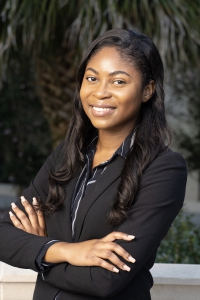
Third-year LSU Law student Rochelle Bogle, a dedicated advocate for justice and legal reform, has been selected for the ABA Legal Education Police Practices Consortium Fellowship (LEPPC).
Rochelle Bogle, a dedicated advocate for justice and legal reform who is in her third year of studies at the Paul M. Hebert Law Center, has been selected for the ABA Legal Education Police Practices Consortium Fellowship (LEPPC). In this fellowship, Bogle will research police practices in Louisiana, providing critical insights that could drive positive change in law enforcement and beyond.
“I am incredibly honored to have been selected as the LSU Law fellow for the ABA Legal Education Police Practices Consortium,” stated Bogle, who was nominated for the fellowship by LSU Law Dean Alena Allen. “This is an opportunity to engage in a meaningful dialogue and research surrounding police practices.”
The deans of ABA-accredited law schools created the LEPPC in the wake of the murder of George Floyd and other Black Americans by police in 2020. Designed to address the pressing need for comprehensive, coordinated research, and analysis of police practices in the United States, its mission is to bridge the gap between legal education and the practice of policing to foster a collaborative environment in which legal scholars and practitioners can work together to study and propose reforms to policing.
“The consortium’s mission aligns perfectly with my passion for justice and legal reform, and I am excited about the possibilities this fellowship holds,” said Bogle, who serves as president of the Black Law Students Association at LSU Law and is also a member of the Board of Advocates.
By combining the expertise of legal scholars and practitioners, the LEPPC aims to produce research, recommendations, and policy proposals that can lead to meaningful reform in police practices across the United States.
Each ABA-accredited law school may nominate students for the LEPPC. Bogle’s selection for the consortium will involve research that will shine a light on critical issues and lead to positive changes in police practices in our community. Her selection for this fellowship is a testament to her exceptional qualifications, her dedication to improving police practices, and her promise as a future leader in the field of law and justice.








